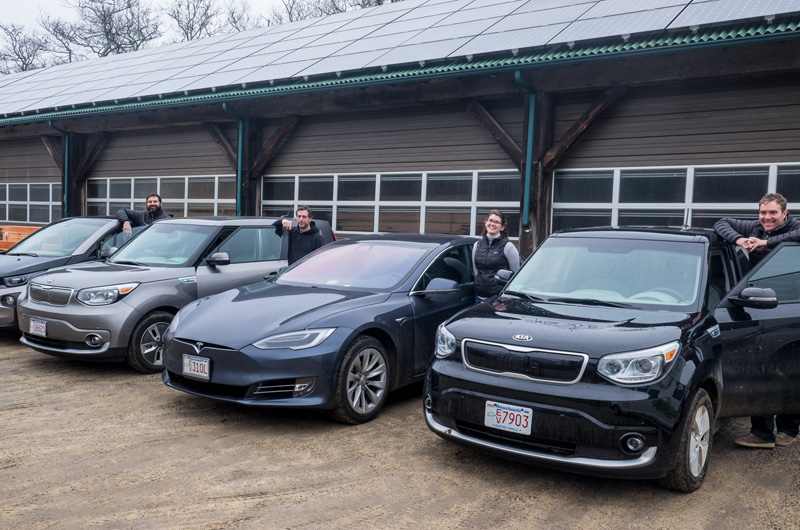Paul Pimentel of Edgartown has been driving an electric car around Martha’s Vineyard for six years and never had an issue with running out of electricity.
“No I have not, because the prospect of that means walking home,” said Mr. Pimentel with a laugh. “I can go back and forth to the ferry or over to West Tisbury three or four times, in any one day and not recharge.”
Mr. Pimentel, senior vice president of the energy company Noresco, has figured out to the penny how much he realizes in savings from his car, compared with a similar gas powered vehicle. He also utilizes solar power at his home, so when the sun is shining he charges the vehicle directly from his solar panels, reducing operating costs further.
But he is not content to save money for himself. For him, it is a movement.

“One of my goals is to try to get the Island to convert to electric vehicles because it’s a perfect application, in my opinion,” he said.
Mr. Pimentel is not alone in his sentiment. Many electric vehicle enthusiasts say the Island is a perfect test track, with its limited geographical boundaries and its low speed limits. But it’s not just individuals leading the way.
The Vineyard Transit Authority (VTA) has plans to convert its entire fleet of buses to electric power. In June the first phase begins with six new all-electric buses due to arrive. The buses have a range of 150 to 170 miles.
“Some of our routes do fit in that frame,” said VTA administrator Angela Grant. “Certainly in the shoulder season our routes all fall in that 150 to 200 mile range per day. Our busiest routes don’t quite do that, they exceed that.”
For now, the electric buses will run on the shorter routes, with a portable charger at the ready if the buses run low on battery power.
“I’m hoping by the second week in July we’ll be on the road at least on the two park and rides [Tisbury and Edgartown],” Ms. Grant said. “Those will have a pretty significant impact in terms of noise initially, and obviously air quality, because they’re right in town centers.”
Eventually, the VTA plans to install conductive plates in the ground at key bus stops, so buses can charge while waiting for the next run.

The town of Oak Bluffs is currently leasing four electric vehicles. With rebates, including a large one from a special state program for municipalities, the town pays about $300 per year, per vehicle. Charging stations are located in the town library parking lot where town employees from the board of health, building department, assessors department, and library leave them to charge overnight.
“They’re working great,” said town administrator Bob Whritenour. “The performance and comfort exceeded my initial expectations. The only real problem that we had with them, there were difficulties a couple of days this year when the temperature was zero. One of them was very, very low on power and was having trouble keeping charged. Aside from that sort of anomaly, they have been hugely dependable.”
Most owners say in winter the electric vehicles work less efficiently, knocking 20 to 30 miles off the normal range. The batteries conduct less efficiently and use more energy to heat the vehicle, contributing to reduced performance.
There are public charging stations at Cronig’s Market in Tisbury, but Erik Peckar, general manager of Vineyard Power who drives an electric Volkswagen Golf, said they will only provide a mile or two worth of power during a 30-minute shopping trip. There are now more than 1,500 charging stations in Massachusetts, but it still takes some careful planning and a lot more time than a conventional gas station stop for an extended electric vehicle road trip.
South Mountain Company, a West Tisbury design/building firm, offers its employees a $3,000 incentive to purchase or lease an electric vehicle. So far, seven South Mountain employees have taken the offer. Rob Meyers, energy services manager for South Mountain, drives a base model electric BMW i3.
“The net on the car is pretty low,” he said. “I’m not buying any gasoline and I’m charging the vehicle with solar, so there’s no fuel cost. That’s a pretty good deal.”
Many electric vehicle owners use their cars only when driving on the Island, but Mr. Meyers doesn’t hesitate to take his car off for mainland trips. His car has a range of about 70 miles on a full charge, but the vehicle features a small on-board gasoline generator that can charge the car while driving.
“I use that when I go to Boston, and I’ve had it as far as Portland, Me. That gives me another 80 miles,” he said.




Comments (12)
Comments
Comment policy »